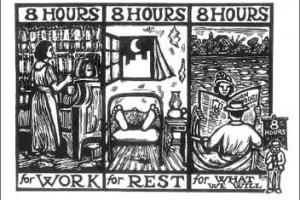Things Are About to Get Really Ugly for the Labor Movement
The American Prospect
 The change -- which has been criticized as too drastic by many employers -- will go into effect on Dec. 1, 2016. It is intended to expand access to overtime pay for otherwise low-salaried workers who log long hours but have been treated as exempt from overtime because they perform some managerial duties.
The change -- which has been criticized as too drastic by many employers -- will go into effect on Dec. 1, 2016. It is intended to expand access to overtime pay for otherwise low-salaried workers who log long hours but have been treated as exempt from overtime because they perform some managerial duties.
 Reader Comments - Defending Immigrants; Protecting Detroit's Water; Israeli and Palestinian Families Comfort Each Other; Hobby Lobby; Peoples Climate March; Overtime Pay; Global Action on Antibiotics; Homeopathy was quackery - readers respond; Full Employment and Shared Prosperity; Mapping Militarism; Limits of Corporate Citizenship; Abe Cohen - R.I.P.
Seeger Family's Memorial Concert Series for Pete and Toshi - July 17 - 21 - New York City and surrounding area
Reader Comments - Defending Immigrants; Protecting Detroit's Water; Israeli and Palestinian Families Comfort Each Other; Hobby Lobby; Peoples Climate March; Overtime Pay; Global Action on Antibiotics; Homeopathy was quackery - readers respond; Full Employment and Shared Prosperity; Mapping Militarism; Limits of Corporate Citizenship; Abe Cohen - R.I.P.
Seeger Family's Memorial Concert Series for Pete and Toshi - July 17 - 21 - New York City and surrounding area
 Reader Comments - Defending Immigrants; Protecting Detroit's Water; Israeli and Palestinian Families Comfort Each Other; Hobby Lobby; Peoples Climate March; Overtime Pay; Global Action on Antibiotics; Homeopathy was quackery - readers respond; Full Employment and Shared Prosperity; Mapping Militarism; Limits of Corporate Citizenship; Abe Cohen - R.I.P.
Seeger Family's Memorial Concert Series for Pete and Toshi - July 17 - 21 - New York City and surrounding area
Reader Comments - Defending Immigrants; Protecting Detroit's Water; Israeli and Palestinian Families Comfort Each Other; Hobby Lobby; Peoples Climate March; Overtime Pay; Global Action on Antibiotics; Homeopathy was quackery - readers respond; Full Employment and Shared Prosperity; Mapping Militarism; Limits of Corporate Citizenship; Abe Cohen - R.I.P.
Seeger Family's Memorial Concert Series for Pete and Toshi - July 17 - 21 - New York City and surrounding area
 Changes in labor market policies and practices have played an important role in the dynamic of rising inequality and wage stagnation for the vast majority. One example of a change in labor market policy that has eroded the standing of typical workers vis-à-vis their employers and contributed to this dynamic is the right of workers to earn overtime pay premiums for working excessive hours.
Changes in labor market policies and practices have played an important role in the dynamic of rising inequality and wage stagnation for the vast majority. One example of a change in labor market policy that has eroded the standing of typical workers vis-à-vis their employers and contributed to this dynamic is the right of workers to earn overtime pay premiums for working excessive hours.
Spread the word